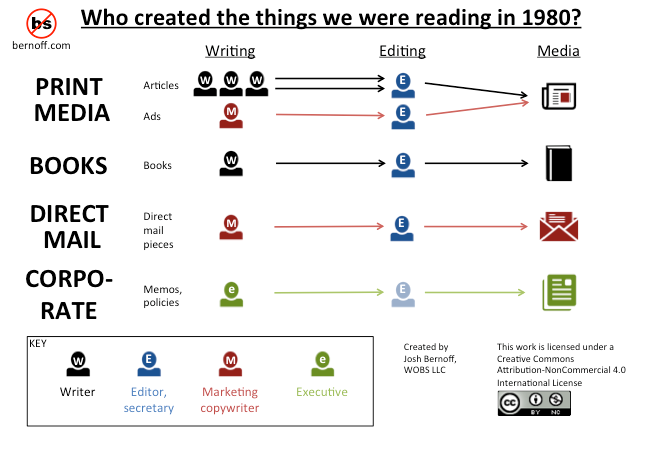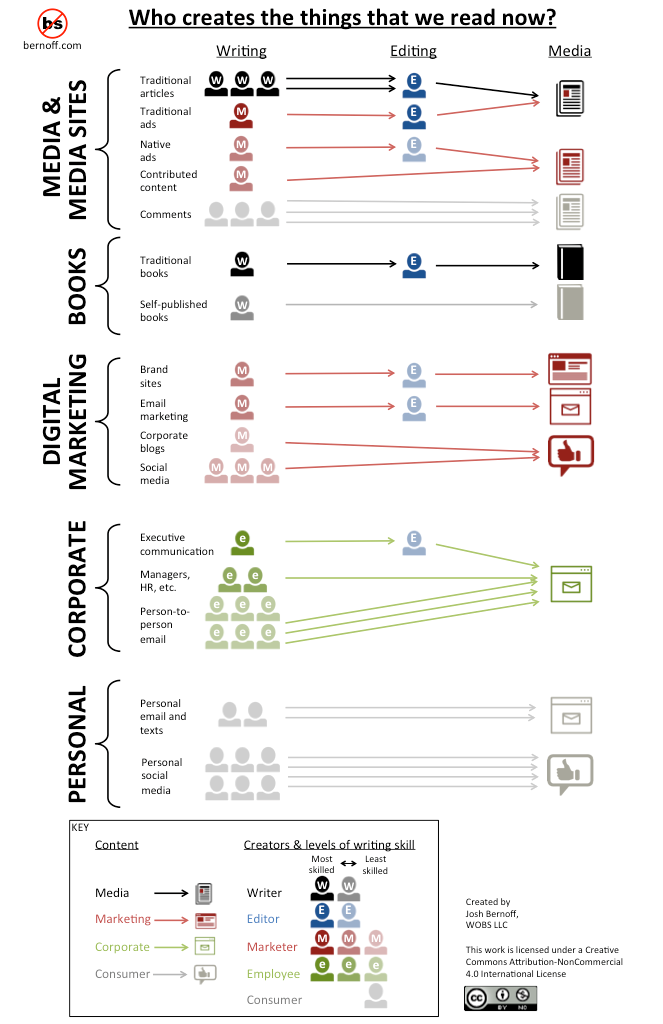Why there is so much bullshit: an analysis
 All day long we read on our various screens. This has vastly increased the demand for content, which comes to us through many channels. But those who create it have forgotten what good writing is.
All day long we read on our various screens. This has vastly increased the demand for content, which comes to us through many channels. But those who create it have forgotten what good writing is.
Think back to the world of 1980. The average consumer or businessperson at that time had no email, and there was no Internet. What we read was printed: newspapers, magazines, books, and the occasional memo.
Was there bullshit in 1980? Of course there was — politicians and stupid managers existed then, too. But our reading material came from media companies that mass-produced printed material and distributed it to hundreds of thousands of magazine subscribers, book readers, direct mail recipients. Professional writers or marketing copywriters produced it. Since it was expensive to create, it went through an experienced editor who reviewed both content and language. In the workplace, executives who wrote memos had secretaries to type them, and the secretaries prevented the executives from saying anything too stupid.
 The picture now is vastly different. As you can see from the graphic below, most of what you read comes directly from the fingertips of the person who wrote it to your eyeballs, with no editorial process. I don’t just mean editing for grammar; no one is editing for content, either. Recall my definition for bullshit: any form of communication which does not communicate clearly and accurately. With no editors, clarity and accuracy are hit or miss.
The picture now is vastly different. As you can see from the graphic below, most of what you read comes directly from the fingertips of the person who wrote it to your eyeballs, with no editorial process. I don’t just mean editing for grammar; no one is editing for content, either. Recall my definition for bullshit: any form of communication which does not communicate clearly and accurately. With no editors, clarity and accuracy are hit or miss.
The consumer still reads lots of highly edited media and ads. However, that content is sprinkled with native ads and contributed content of dubious quality, plus random reader comments. Traditional book editing is much less rigorous than it used to be (ask any author); self-published books get very little review.
Marketers now must now fill a vast set of communications channels including Web sites, emails, Facebook pages, Twitter feeds, and Tumblr blogs. Inexperienced writers create much of this content and often publish it with little supervision.
The corporate world has changed completely. There are very few secretaries; people communicate directly with each other, unmediated. Your inbox is filled with a random variety of first-draft emails from colleagues, managers, HR departments, and executives.
If we properly trained all of these writers to write clearly, then we wouldn’t be mired in so much bullshit. But the authors of all this material almost certainly learned to write from rigid, test-focused high-school writing teachers and humanities professors enamored of the academic tradition of the passive voice. Insecure writers buttress their prose with hedges, vague qualifiers, and jargon. There’s rarely a penalty for writing too long. In case some clarity were to sneak through, there are always a few colleagues ready to offer helpful suggestions, and the easiest way to make them all happy is to muddy up the text enough to satisfy all of them.
That, my friends, is a recipe for bullshit. Inexperienced, poorly trained writers and editors who are so eyeball-deep in the stuff that they even if they once knew what good clear writing is, they have forgotten it. Our vast appetite for written content and the fragmented channels on which we read it guarantee that most of what we read will be crappy.
Do not be depressed. I’m not advocating that we shut down the internet and return to 1980. There is opportunity here. Amidst this vast fog of mediocrity and confusion, clear, powerful writing stands out like a beacon. Learn it and your emails, your Web sites, and your media will stand out from the rest. Have faith. It’s not that hard to be brief, clear, and not boring. You just have to care about quality.
Photo: Ray Bernoff (Deer Island Waste Treatment Plant)
Graphics: Josh Bernoff

Great,
Excellent, clear, concise, explanation. (without bullshit!!)
Hi,
I teach English as a Second Language and I have to compete with texts, FB etc. Students become hysterical, even physically violent when I tell them to stop using their phones. The mere physical presence of so much information has led to a student body that simply cannot resist the attraction of BS. I appreciate your article as it seems to parallel my experience.